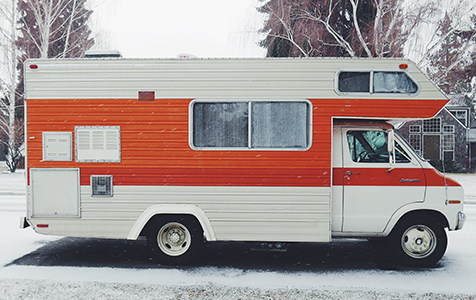5 Hidden Winter Dangers to Watch Out for When Storing Your RV

You’ve gone through the basics of RV winterization, and are ready to put your beloved camper into winter storage - it's time to call it a year, right? Well, maybe not quite yet. Even the most conscientious RV-owners can miss a few pieces of the winterization process, leading to unwanted damages by the time the snow thaws. Set yourself up for success next spring by doing your due diligence now! Today on the blog, the team here at South Thompson RV is sharing 5 hidden winter dangers that RV-owners need to contend with, and how best to avoid ‘em. Read on to learn about their top winterization tips!
1. Mice and Pests. Yep - mice (and insects) can fit through incredibly tiny spaces to enter your RV, where they’ll set up camp to stay warm for the winter. One of the main ways that mice sniff out a prime spot to call home is leftover food and crumbs. Take your unit off the menu by removing all food from your RV (including non-perishables), and giving it a thorough cleaning to remove any remaining crumbs or spills.
2. Leaks. Water and moisture can easily find their way inside, especially if your seals and caulking isn’t up to snuff. Give your RV a careful inspection, and seal/caulk any areas that look as though they’re cracked or damaged. Pay extra attention to windows and doors, your roof and the area around your ceiling ventilation unit (if you have on), as these tend to be common places where leaks can occur. You can purchase and apply a protective seal to the entire outer shell of your unit as well, to further guard against damage caused by leaks.
3. Frozen Water. When it comes to RV storage, moisture is not your friend. One of the most common issues we see every spring is burst/damaged pipes due to water being left behind in the plumbing system. There are ways to help rid your system completely of moisture, such as using an air compressor to blow-out your plumbing. Don’t forget about running RV-specific pink antifreeze through your lines well before your RV is left in subzero temperatures.
4. Break-Ins. This one breaks our hearts. Sadly, off-season RV break-ins is something that you need to consider. You can find specific RV locks that work wonders against protecting your camper, and we recommend that you maintain good RV insurance 365-days a year. Not sure which lock to use? Don't hesitate to reach out and ask one of our South Thompson team members for advice!
5. Mold and Mildew. If you’ve ever accidentally left behind food or a sticky coffee cup in your trailer over the winter, you can attest to the unpleasant smell that greets you on RV-opening day! Besides attracting pests (see tip #1), leaving behind food, crumbs and sticky surfaces can be a major breeding ground for mold. Perform a thorough cleaning (including drying out all surfaces and the inside of your refrigerator) before your RV settles down for a long winter’s nap to save yourself from stomach-turning surprises in the spring.
Contact Us for Help With Your Winterization Needs

Winterizing your RV is a lot of work, but it’s also a necessary part of protecting your investment and making sure that it stays in A+ shape for years to come. If doing all of the work yourself seems like a daunting task, then don’t hesitate to contact your local RV dealer for assistance - like the friendly folks here at the South Thompson Service Department! We help hundreds of customers with their winterization (and de-winterization) needs each and every year, and we have the space, tools and experience to get the job done quickly and efficiently. We’re here to serve you as best we can, so whether you need us to do the entire thing or just want help checking off a few last items, we’re happy to oblige. Need a place to store your RV for the winter? We can help with that too - simply reach out to our team for assistance. Protect your trailer, camper or motorhome this winter, so that you can get back to making memories in the great outdoors at the first signs of spring!